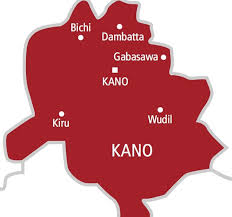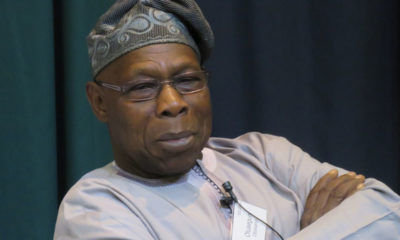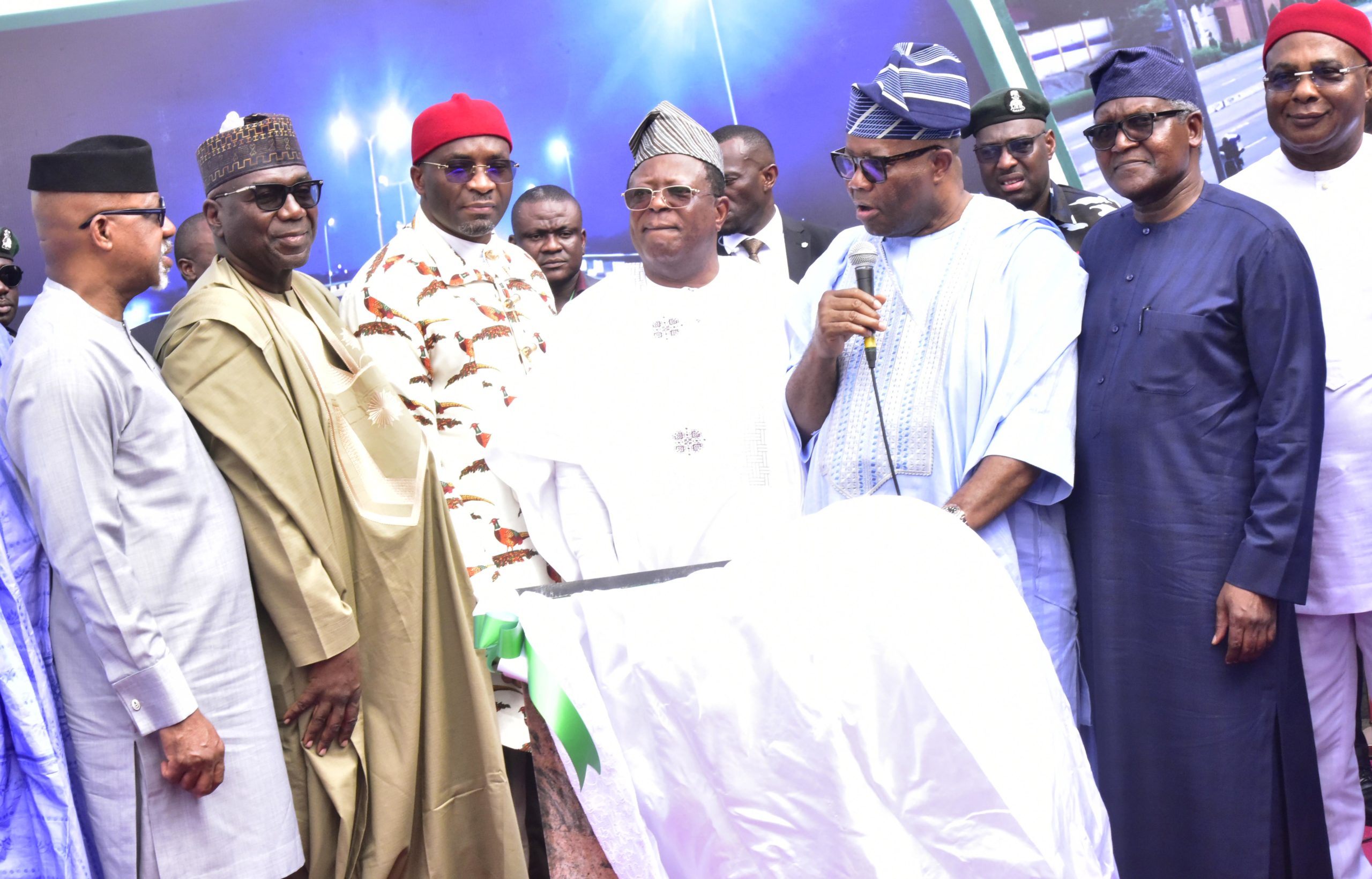NEWS
Africa’s Richest Man Says He Needs 35 Visas To Travel In Africa – Way More Than A European Visitor

Even Africa’s wealthiest man has trouble traveling in his own continent.
Despite doing business in multiple countries, Nigerian-born Aliko Dangote complains he faces far more hurdles crossing Africa than visitors with European passports ever do.
“As an investor, as someone who wants to make Africa great, I have to apply for 35 different visas on my passport,” Dangote told the recent Africa CEO Forum in Kigali.
“I really don’t have the time to go and drop off my passport in embassies to get a visa,” he said to laughter from the audience.
The 67-year-old entrepreneur’s visa woes have reignited a fresh firestorm about the frustrations of traveling within Africa for Africans.
It’s even more infuriating for many Africans that European passports from former colonial masters have more visa-free access in Africa than many African passports.
It’s a point Dangote made powerfully in Kigali, when he turned to the French executive next to him and deadpanned: “I can assure you that Patrick (Pouyanné, CEO of Total Energies) doesn’t need 35 visas on a French passport, which means you have freer movement than myself in Africa.”
Dangote commended Rwanda, which eliminated visas for all African nationals in 2023. Benin, The Gambia and Seychelles also offer visa-free access to all Africans.
But many African countries still require visas from other Africans and the experience is fraught with discrimination, hostility and sky-high fees.
‘Humiliating Experience’
Nigerian travel filmmaker Tayo Aina says he was forced to give a stool sample in front of an Ethiopian immigration officer, to confirm he hadn’t ingested any drugs, when he landed in Addis Ababa in April 2021.
“It was my most humiliating experience traveling within Africa,” he told CNN by phone from London. He has also been detained at airports in Kenya and South Africa because of his Nigerian passport.
This year, Aina announced that he bought a passport from the Caribbean country of St Kitts and Nevis for $150,000 so he can travel more freely.
“Sometimes you go to a country, and it is no longer visa-on-arrival. There are cases where people get deported when they land because they changed the policy mid-flight,” the 31-year-old YouTuber says.
The African Union has said one of its goals is to remove “restrictions on Africans’ ability to travel, work and live within their own continent by transforming restrictive laws and promoting visa-free travel” but implementation has been slow. Free movement within the continent is a critical part of the African Continental Free Trade Area, but action hasn’t followed the commitments.
The fear of permanent migration is one of the reasons why African nations don’t make it easy for other Africans to visit, migration researcher Alan Hirsch told CNN.
“There’s a fear in richer African countries that people from poorer nations might be looking for a way to permanently move there,” he explains.
“A lot of Africans cross borders informally and we don’t have a real record of that. Some countries fear people applying for asylum and then disappearing under the radar.”
The retired University of Cape Town professor runs a program on migration at the New South Institute think tank in Johannesburg. He says the integrity of passport and visa systems especially in poorer African countries has also held back Africans’ mobility. “People have found illegal ways of obtaining passports, for example someone pretending to be Burundian without actually being from that country.”
Fresh bottlenecks
While Africans can move relatively freely within their regions, traveling further away is still challenging. Travelers from East African Community countries don’t need a visa within the block and most parts of Southern and West Africa are open to nationals from the respective regions.
But even what looks like progress can introduce some fresh bottlenecks. A Nigerian visa on arrival used to be $25 for Kenyan passport holders. But after changes to the application process, Kenyans now have to apply for a Nigerian e-visa in advance, at a cost of $215.
Kenyan President William Ruto famously promised to eliminate visas for everybody traveling to the East African nation. He introduced an Electronic Travel Authorization instead but the application process is similar to that of a visa. It costs $30 without processing fees and approval may take several days. Many visa applications require an application form, bank statements, flight and hotel bookings. Applicants are often rejected for incomplete documentation or for unclear reasons.
“South Africa held my passport for almost five months,” the Nigerian content creator Tayo says.
His new St Kitts passport allows him to go to more African countries than his Nigerian passport.
Culled from CNN.
NEWS
Kano Police Warn Residents Of Imminent Terror Attack Threats

The Kano State Police Command has warned residents of a potential terror attack, targeting public gatherings in strategic locations across the state.
In a statement issued on Friday, the command’s Public Relations Officer, SP Abdullahi Haruna, disclosed that intelligence reports indicated suspected terrorists were planning to carry out attacks.
“The Kano State Police Command, in liaison with other security agencies, has received intelligence reports of suspected terrorists planning to launch attacks on public gatherings in strategic locations within Kano State.
READ MORE: Savannah Energy Provides Unaudited FY 2024 Trading Updates
“In response, we hereby urge residents to exercise caution and avoid crowded places and environments until further notice as a preventive measure to enable security operatives to identify and dislodge possible attackers,” the statement read.
To address the threat, the police command has enhanced security arrangements across the state. SP Haruna revealed that specialized units, including the Explosive Ordinance Disposal (EOD) and the Chemical, Biological, Radiological, and Nuclear (CBRN) teams, have been deployed to strategic locations and are on high alert.
“A team of experts from the command’s Explosive Ordinance Disposal, Chemical, Biological, Radiological, and Nuclear units have been deployed to strategic locations and are on high alert.
“The unit can be contacted through: 08169884988 or 07067157218 for report of suspicious persons or item(s),” Haruna stated.
Residents have been urged to remain vigilant and report any suspicious activities to the nearest police station or contact the command through the designated hotlines.
“The command remains committed to protecting lives and properties as well as maintaining law and order in Kano State.
“We appreciate the support and cooperation of the good people of Kano State and urge everyone to remain vigilant. Your vigilance and cooperation are crucial in ensuring public safety,” the statement concluded.
NEWS
Ifon-Ilobu-Erin Osun Land Disputes: Osun Constitutes A 100-Member Boundary Resolution Committee

In the bid to resolve the incessant land disputes between the communities of Ifon, Ilobu and Erin Osun, the Governor of Osun State, Senator Ademola Adeleke has constituted an enlarged 100-member high powered land crisis resolution committee in which each of the affected communities has 25 representatives, and the state government represented by 25 members.
The Osun State Commissioner for Information and Public Enlightenment, Oluomo Kolapo Alimi made the disclosure in a statement in Osogbo, on Friday.
He revealed that the Ataoja of Osogbo land, Oba Jimoh Adetunji Olanipekun Larooye is the Chairman of the Committee, while a retired judge of Osun State Judiciary and Chairman, Osun State Boundary Commission, Justice Moshood Adekunle Adeigbe, would serve as the Co-Chairman.
According to Alimi, Gov Adeleke put in place the Committee with a view to bringing a lasting end to the incessant land disputes among the three affected communities.
ALSO READ: Leadership Newspaper Backs Adeleke For Second Tenure, Names Him ‘Gov Of The Year’
It was gleaned from the statement that there were four other traditional rulers on the panel, including His Royal Majesty; Oba Abioye Oyebode, the Olokuku of Okuku, His Royal Majesty; Oba Adams Iyiola Bamidele Yusuf, the Oloba of Oba Oke, His Royal Majesty; Oba Adekeye Oyedare, the Oloyan of Oyan and His Royal Majesty, Oba Akeem Ogungbamgbe,The Owaloko of Iloko-Ijesha.
Other members are Umar Abba Mohammed, Osun State Commissioner of Police, Ayoola Kehinde, Osun State Director, Department of State Services( DSS) Brigadier General, Aliu Mohammed, Commander E.C.C, Ede, Sotiyobo Igbalawola, Osun State Commander, Nigeria Security and Civil Defence Corps( NSCDC), Anthony Chikezie, Commander, Immigration Service, Osun State, Adekunle Omoyele, Osun State Commander, Amotekun Corps, and Special Adviser to Osun State Governor on Security, Barrister Dare Ojo.
Also on the enlarged Committee, where members are enjoined by Gov Adeleke to bring in their wealth of experience to bear on the highly critical assignment, are the Chairman, NBA Osogbo branch, Yemi Abiona, Esq; the Chairman, NBA, Ikirun, Niyi Akinsola, Esq; the Chairman, NBA, Ile Ife, Tope Olajoko, Esq; the Chairman, NBA, Ilesha, Raymond Oki, Esq; Others appointed to serve on the Ifon- Ilobu- Erin Osun Peace Resolution Committee are; Soladoye Abioye, the Surveyor General of Osun State – Dr Sodiq Olohunde, Office of Chief of Staff to the Governor, Marufat Adekemi Bello, Permanent Secretary , Ministry of Justice – Femi Ogundun,- Permanent Secretary, Ministry of Local Govt and Chiertincy Affairs, Dr Fritz Mobolaji Olaoye, Permanent Secretary, Ministry of Lands and Physical Planning.
Completing the list of the Committee members are Comrade Wasiu Ajadosu, Osun NUJ Council Chairman, Comrade Waheed Lawal, Osun Civil Society Coalition and Comrade Saka Mao, a Public Affairs Analyst
The statement has it that Gov Adeleke, will on Tuesday, the 28th of January, 2025 perform the swearing in ceremony of the 100-member enlarged Ifon, Ilobu, Erin Osun Land Crisis Resolution Committee, at the Multi purpose hall of Local Government Service Commission, State Government Secretariat, Abere Osogbo by 11:00am.
NEWS
Okpebholo Moves To End Indiscriminate Parking, Gridlock In Edo State

Edo State Governor, Senator Monday Okpebholo, has charged the Managing Director of the Edo State Traffic Control Management Agency (EDSTMA), Engr. Stainless Ijeghede on indiscriminate parking and traffic gridlock, especially in market areas.
According to a statement in Benin City on Friday, by Chief Press Secretary to Edo State Governor, Fred Itua, his principal gave the charge while decorating Ijeghede with his new rank as the head of EDSTMA.
He noted that while addressing the new Managing Director and his personnel at the Exco Chambers in Government House, Gov Okpebholo pointed out that the agency should do its job well by ensuring free flow of traffic across the state.
He called on Ijeghede and men of the agency to ensure they checked indiscriminate parking of vehicles and buses, especially in market areas.
“Edo State belongs to all of us and whatever we are doing, we should do it with care not to harm anybody. I appeal to EDSTMA to ensure that the city is well kept because whenever I drive round town, I see vehicles everywhere as the city is not well kept.
“This is your primary assignment. You should ensure the city is well kept as vehicles park indiscriminately and they are causing obstruction. Traffic is not flowing as it should and it is causing serious gridlock. Is it that you are not doing your job well?
ALSO READ: Leadership Newspaper Backs Adeleke For Second Tenure, Names Him ‘Gov Of The Year’
“Is it that you are not doing your job well or because you have a new leader that is why traffic is not flowing, or because you don’t know your job?
“You people should wake up and keep the state clean. Make sure that vehicles are parked well especially in the market areas. Monitor markets very well as these areas are looking really unkempt with vehicles and buses parked indiscriminately, causing traffic gridlock. Edo people are worst hit. They suffer from this. Ensure free flow of traffic so that the people will be happy,” Governor Okpebholo emphasized.
The EDSTMA boss, thanked Gov Okpebholo for the opportunity to serve the people of Edo State and assured him of the loyalty of the agency.
He added that his men will do their job professionally and ensure that the is free flow of traffic across the state.


















